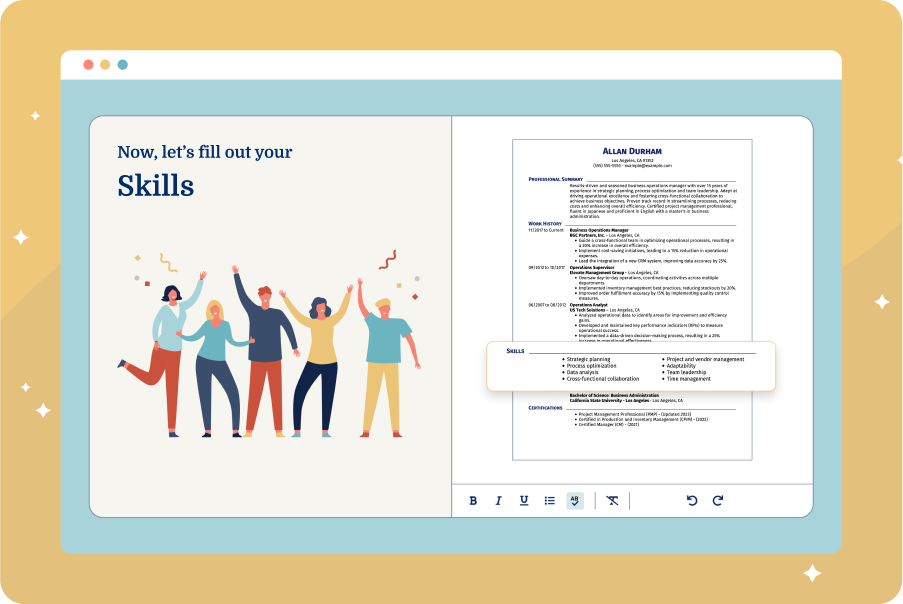Our customers have been hired at: *Foot Note
Table of Contents
Get started with MyPerfectResume today!
- Build a resume on any device
- Pick an ATS-friendly template
- Tailor with AI copy suggestions
Leaving a job is a significant decision that often sparks thoughtful reflection about personal growth, job satisfaction, and future career goals.
The reasons for this transition can range from seeking better opportunities and higher compensation to wanting a different work culture or a more aligned career path.
In this guide, we’ll walk through 10 common and valid reasons for leaving a job. Explore advice for discussing your reasons during an interview and strategies to help you land your next role faster.
Identifying Your Reasons for Leaving a Job
Whether you're seeking new challenges, better work-life balance, or a fresh start, it's important to understand the reasons behind your choice—and how to talk about them confidently.
Taking the time to clarify your motivations not only ensures that you’re making a thoughtful decision but also empowers you to communicate your reasons clearly to potential employers.
By knowing your “why,” you can approach this transition with confidence and purpose, ready to take on new opportunities that align with your long-term aspirations.
Need a resume to start applying to new roles? You can use our AI Resume Builder to craft a compelling resume that highlights your key skills, achievements, and readiness for the next step in your career.
What Are Good Reasons To Leave a Job?
Explore our list of reasons for leaving a job below to start reflecting on your motivations and gain clarity on your next career move.
1. Lack of growth opportunity
When your current job no longer provides the chance to develop new leadership skills, take on more responsibility, or advance to higher levels, it can leave you feeling stagnant and unfulfilled.
If you feel stuck in a role with limited opportunities for growth or learning, it’s natural to want to seek new challenges and move forward in your career.
Pursuing a role that offers growth potential not only helps you stay motivated but also sets you up for long-term success and job satisfaction.
2. Better work-life balance
When your job demands more time and energy than you can give, it starts to impact your well-being, relationships, and overall happiness.
Whether it's constant overtime, weekend work, or the inability to disconnect from work outside of office hours, burnout becomes a real risk.
Seeking a role that offers flexibility, manageable expectations, or remote options can significantly improve your work-life balance and reduce stress.
To find opportunities that prioritize work-life balance and help you build a routine that supports both your career and personal life, consider researching companies with fully remote jobs.
3. Higher compensation
In some cases, employers may not be able to match industry salary standards, or salary increases may be infrequent or uncompetitive.
A desire for better compensation isn’t just about earning more—it's a reflection of the value you bring to your role and the recognition you deserve for your hard work.
Better compensation often comes with enhanced benefits such as healthcare, retirement plans, and bonuses, all of which can contribute to your long-term financial security.
Explore high-income skills that can position you for roles that offer higher compensation and greater career growth opportunities.
4. Career change
A career change is one of the most transformative decisions you can make, often driven by a desire for new challenges, a passion for a different field, or a need for a more fulfilling role.
Whether you’re switching industries entirely or pivoting to a different function within the same field, a career change reflects a personal commitment to growth and long-term satisfaction.
If you’re considering a career change, it's important to clearly define your motivations, identify your transferable skills, and be prepared to start at a new level in your new field.
5. Relocation
Relocation—whether driven by family obligations, a desire for a better lifestyle, or the need to reduce the cost of living—often requires reevaluating your career options.
In many cases, remote work may not be feasible, or your current role may not align with the job market or opportunities available in your new location.
Recent return-to-office mandates can also make it challenging to stay in your current position if commuting isn’t realistic.
Ultimately, relocating can open doors to fresh opportunities that better align with your new circumstances and long-term goals.
6. Layoffs or restructuring
If you were laid off due to budget cuts, department downsizing, or company restructuring, you're not alone. This is one of the most common reasons people leave jobs.
Although losing a job unexpectedly can be stressful, it also presents an opportunity to reassess your career goals and explore new possibilities.
Many job seekers use this time to upskill, shift directions, or find a company that’s a better fit for their strengths and aspirations. Explore our job loss guide for additional tips and information.
7. Burnout or excessive stress
Persistent stress, emotional exhaustion, or an overwhelming workload can lead to worker burnout, especially in fast-paced or understaffed environments.
Recognizing burnout as a legitimate reason to step away from a role shows self-awareness and a commitment to maintaining balance.
Leaving a high-stress environment is a proactive decision to prioritize your health and seek a more sustainable work situation.
8. Mismatch with company values
If you find that your values don’t align with your company’s culture or leadership, it can create discomfort and dissatisfaction.
When your day-to-day tasks feel disconnected from your sense of purpose or the company’s goals don’t resonate with you, it’s natural to consider a change.
A recent MyPerfectResume job satisfaction survey revealed that 74% of respondents place a high priority on doing meaningful work.
Seeking an organization where you can do meaningful work that aligns with your values can lead to greater job satisfaction, stronger engagement, and a renewed sense of purpose in your career.
9. Commute or remote work needs
If you’re spending hours each day in traffic or on public transit, it’s natural to start questioning whether the job is worth the personal cost.
Identifying how your work location affects your daily life can help you find a role that better supports your lifestyle and productivity.
If transportation time is negatively impacting your well-being or overall job satisfaction, you might consider exploring roles with a shorter commute time or fully remote positions.
Explore work-from-anywhere jobs to find opportunities that fit your schedule, reduce stress, and give you the freedom to work where you thrive.
10. Personal reasons
Personal reasons for leaving a job, such as health challenges, caring for a family member, returning to school, or reassessing your priorities, are valid and impactful factors to consider.
Making space for personal needs is essential to long-term job satisfaction, mental well-being, and a sense of fulfillment in both your career and personal life.
Explaining Your Reasons for Leaving a Job on Applications
Some job applications may include a question about why you are leaving your current role or why you left a previous role. Keep your response brief, honest, and forward-looking.
Whether you’re seeking new challenges, a better work-life balance, or a role that aligns more closely with your professional skills, frame your departure as a positive step in your career.
This demonstrates to employers that you’re making a thoughtful, intentional career move, highlighting your focus on growth and alignment and making you a more compelling candidate.
Here is an example answer for discussing your reasons for leaving on a job application:
Discussing Your Reasons for Leaving a Job During Interviews
When it comes time to discuss why you left your previous role during an interview, your goal is to present your reasons in a way that highlights your professionalism and commitment to growth.
Explore the tips below to learn how to navigate this conversation confidently. We also recommend checking out our interview prep guide for additional strategies to ace your interview.
Be honest but positive
Employers often ask this question to understand your motivations, and your response can reveal a lot about your approach to work and career development.
Honesty is key, but you should always frame your reasons in a way that highlights your strengths and future ambitions.
For example, if you left due to a lack of growth, focus on how you’re eager for new challenges rather than criticizing your past employer. Here is a sample answer:
“I reached a point where I wasn’t able to grow further in my role, and while I valued the experience, I wanted to take on more responsibility and face new challenges that align with my career goals.”
Keep it professional
Even if your reason for leaving involves negative experiences, it’s important to remain professional and avoid bad-mouthing previous employers.
Instead, focus on the positives and the lessons you learned. For example:
Highlight future goals
Rather than dwelling too much on why you left, shift the conversation toward what excites you about the new role. This shows you’re forward-thinking and focused on growth. For example:
Tips for Landing Your Next Role
- Tailor your resume for each application: Create a targeted resume that highlights the skills and experience most relevant to the role you're applying for. Use keywords from the job description to get past applicant tracking systems (ATS).
- Craft a strong, personalized cover letter: This is your chance to go beyond the resume and share why you’re genuinely excited about the role. Explore our library of cover letter examples tailored to various roles, industries, and career levels.
- Practice your interview responses: Prepare clear, confident answers to common technical and behavioral interview questions—especially about why you left your last role and what you’re looking for next.
- Follow up after interviews: A thoughtful follow-up email after an interview reinforces your interest and helps you stand out from other candidates. Send your thank-you note within 24 hours after your interview.
How To Leave a Job on Good Terms
Leaving a job is an important step toward your next opportunity, and how you handle the transition can set the tone for future success.
Giving proper notice (generally two weeks) and writing a thoughtful resignation letter shows professionalism and helps maintain strong relationships with your current employer.
If possible, offer to support the transition by documenting your responsibilities or training a replacement. It’s a simple gesture that can leave a lasting, positive impression.
Every job change is a chance to build your network and grow your career, and leaving on good terms keeps the door open for future opportunities or glowing recommendations.
Key Takeaways
- Clarifying your reasons for leaving a job allows you to make more thoughtful career decisions and find roles that truly align with your goals.
- Whether you're leaving for growth, a better work-life balance, higher pay, or personal reasons, it's important to be clear and confident when explaining your decision.
- Leaving on good terms, being honest yet professional, and focusing on the future can open doors to new opportunities and ensure a smooth transition to your next role.
FAQ
Should I resign without another job lined up?
Deciding whether to resign from your current role without another job lined up depends on your circumstances and priorities.
If you’re facing burnout, significant stress, or negative impacts on your health from your current role, resigning may be a necessary step for your well-being.
However, it’s important to ensure you have enough financial stability to support yourself during your job search, as finding a new position can take time.
Ultimately, deciding when it’s time to leave a job is a personal decision that requires balancing your immediate needs with long-term career goals.
How do I explain a gap on my resume?
To explain a gap on your resume, be honest and direct about the reason, but keep the focus on how you used that time productively.
Whether it was for personal reasons, further education, or job searching, explain how you stayed engaged, learned new skills, or contributed to a cause.
By focusing on the positive outcomes from the gap, you can show that you’ve been proactive and are ready to move forward in your career.
See our guide on how to explain employment gaps on your resume for tips and examples from career advice experts that can help you discuss this topic professionally.
Can I leave a job I just started?
While you can leave a job you just started, it’s important to approach the situation thoughtfully and carefully consider your reasons for leaving.
If the challenges are temporary, it might be worth discussing with your manager to see if things can be improved before deciding to leave.
While it’s generally understandable to leave a job that isn’t a good fit, frequently switching jobs early in your career can raise concerns with future employers.
Ultimately, if you feel that staying in a job isn’t serving your long-term goals or well-being, it’s okay to move on—just ensure that you are thoughtful about how you go about it.
Our customers have been hired at:*Foot Note














